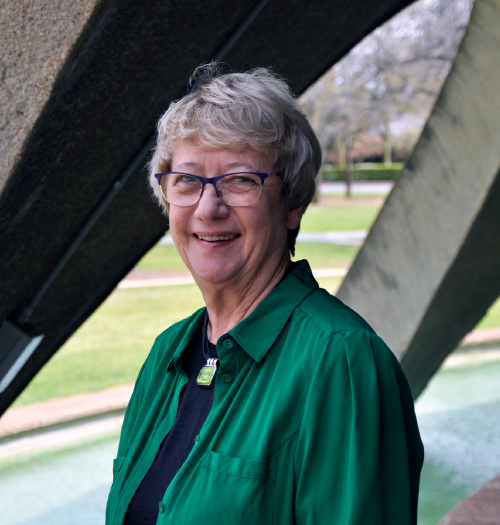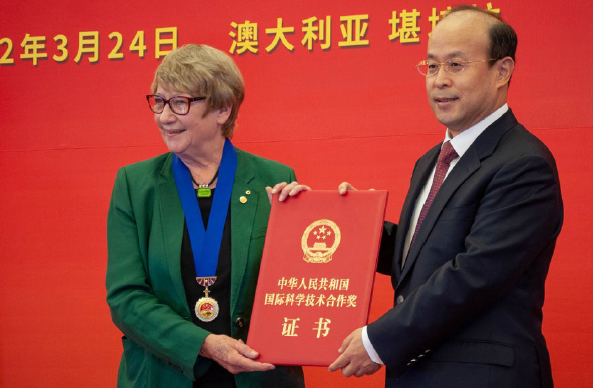Director’s preface

This report summarises the activities and achievements of the Australian Research Council Centre of Excellence for Core to Crust Fluid Systems (CCFS) since January 2021 (CCFS formally commenced mid-2011). Activities include research, technology development, stakeholder engagement, international links and research training. It also provides future research directions.
The overarching goal of CCFS is to understand Earth’s internal dynamics, evolution and fluid cycles from core to crust. CCFS leverages the capabilities of three national centres of research excellence in Earth and Planetary Sciences: GEMOC from Macquarie University (Administering Institution), Curtin University (TiGeR) and CET at the University of Western Australia (Collaborating Institutions). The Geological Survey of Western Australia is a Partner Institution and researchers from Monash University, the University of Melbourne and the University of New South Wales are formally affiliated.
The 7-year allocated Centre funding from the ARC ceased at the end of 2018, but ARC formally granted continuation of the status of CCFS as an ARC Centre of Excellence for three years, contingent on demonstration of a relevant, funded continuing research program and participation of key researchers.
How has CCFS made a difference?Selected examples are listed below.
Pioneering Integrative approach to understanding Earth across deep time and space (4D) The conceptual framework of integrating geochemical, geophysical, geological, tectonic and geodynamic datasets in a GPS environment has revolutionised our holistic understanding of the inaccessible deep Earth. It has led to the predictive modelling of the location of large economic deposits and enhanced understanding of how the Earth works and has evolved. CCFS advances in these geoscience disciplines seamlessly incorporate Bayesian mathematical approaches and innovative imaging techniques to probe planetary, global terrain and nanoscales, thus advancing geoscience capabilities.Training a new generation and thus spreading new knowledge across critical areas in society
CCFS has so far graduated 139 PhD students and 50 early-career researchers have participated in CCFS with formal allocated positions. In addition, over 30 international PhD students and more early-career researchers have had extended periods of research in CCFS on externally-funded scholarships and grants, resulting in significant research outputs with CCFS bylines (see CCFS Publications). CCFS postgraduates are producing world-class research with authorship of 20 publications (14 first-authored) in high-impact journals in 2021 and 14 presentations at peak international workshops and conferences (most by virtual mechanisms due to travel restrictions under COVID-19). This cohort forms the future generation of frontline researchers and professionals with comprehensive experience in solving difficult problems with tantalisingly incomplete datasets, into a world future with increasingly complex problems requiring clever integrative approaches from geoscience. We are particularly proud that CCFS-aligned early-career researchers have populated a broad cross-section of professions nationally and internationally including industry, government and commercial environmental agencies, stock exchange advising, state and national geological surveys, commercial geochemical laboratories (e.g., Rio Tinto has now employed 9 former CCFS/GEMOC geochemists) as well as fulfilling valuable high positions in academia (research and teaching). This CCFS diaspora is thus bringing critical knowledge and new understanding of Earth’s behaviour to many areas of society at a serious tipping point in managing climate change and in providing critical minerals for a sustainable national (and global) future.Outstanding Fundamental Research
CCFS has, since 2011, produced 1732 publications in both high-impact journals and books, and in journals targeted for specific audiences. Many more are in the publication pipeline.The Clarivate/Thomson Reuters ongoing recognition of CCFS’ frontline research through citation-, innovation- and highly-cited awards to CCFS researchers, in addition to the Google Australian Researcher of the Year award and naming a CCFS Chief Investigator as one of the “World’s Most Influential Minds” across several years have been documented in preceding Reports. Numerous awards of ‘annual best paper’ in prestigious journals, a constant flow of keynote presentations and awards of best posters and talks at peak and influential conferences and international workshops, by senior, early-career and postgraduate CCFS researchers, all provide evidence of peer recognition internationally.
Frontline advances in geophysics were enabled because of the funding and timeframe provided by the Centre funding including: further development of ambient-noise adjoint-tomography; LitMod’s 3D multi-observable probabilistic inversion for the compositional and thermal structure of the lithosphere and upper mantle (e.g., CCFS Publication #1681 in Nature Geoscience, 2022). All of these seminal contributions and many others are detailed in this and previous Reports and embed geochemical, tectonic, geological and/or advanced imaging, computational and modelling components, emphasising integration across diverse datasets and methodologies.
Technology Development and New Directions
Technology Development sections of the CCFS Reports document the ongoing frontline developments related to in situgeochemical analysis and imaging technologies using the outstanding array of advanced instrumentation accessible across CCFS nodes. Of increasing value is the co-registration of data across all types of digital information so that overlays of multiple datasets provide new insights into the distribution of physical properties, specific elements and chemical domains in the Earth (in many regions to depths of ~400 km) and relationships to the physical properties detected in seismic, magnetotelluric, gravity and magnetic surveys.
Significant novel geochemical instrumental methodologies have resulted in step-changes for characterising the volatile and element distributions and concentrations of volatiles and other elements at increasing resolution and smaller spatial scales.
CCFS is a very active participant in the new and burgeoning NCRIS AuScope Australian Geochemistry Network (AGN). AGN has implemented a national geoscience database, capturing legacy and real-time geochemical datasets aligned with FAIR (Findable, Accessible, Interoperable and Reusable) principles. This will enable the co-registration of multiple digital datasets (e.g., geophysical, geochemical, physical state and properties, time) in multidimensional space for unprecedented imaging of Earth characteristics.
CCFS Equity and Diversity
Since CCFS commenced, the gender balance in PhD students has been approximately equal, with a moderately higher cohort of women; the ECR cohort has had slightly fewer women than men. The Macquarie CCFS academic staff have had approximately even women/men ratios throughout, underpinned by CCFS family-friendly policies including consideration of meeting times to accommodate those with school and pre-school children, and provision of child care during CCFS meetings. Diversity has always been exceptionally high in CCFS, with participants (junior and senior) from over 25 countriesIndustry and end-user engagement
Industry interaction has been an integral component of CCFS. Collaborative projects with industry input (including guidance from CCFS Board members) have shaped, and continue to inform, the relevance of the fundamental research directions, and enabled continuation of relevant CCFS activities. These are fully documented in previous Reports.
Sue O'Reilly receiving the 2020 China International Science and Technology Cooperation Award by H.E. Ambassador Xiao Qian (photo: Australian Academy of Science).
International Collaborations
Global alliances with leading international geoscience groups have been forged through formal collaborative partnerships, programs and exchanges across multiple institutions (including China, Spain, France, Canada, Norway, Germany, South Africa, Taiwan, India, USA). These collaborations have leveraged the Centre funding, expertise and researcher resources and commonly include cotutelle PhD programs, providing the basis for a new generation of productive global research alliances. Recognition of the significance of international collaborations is evidenced by my recent 2020 China International Science and Technology Cooperation Award (delayed due to COVID-19). Presented by H.E. Ambassador Xiao Qian, the award is China’s highest scientific honour for foreign individuals and institutions. Although this award was given to me personally, it is truly shared with the many wonderful Chinese, GEMOC and CCFS scientific colleagues and postgraduate students with whom I have worked over many years. As I said in my acceptance speech, “Science across national borders is the way to a better world for all, and for a more sustainable future for our planet and society.”Shaping International and National Science policy
CCFS researchers are now sought as thought-leaders globally for research related to Earth’s lithosphere and the integrated use of large datasets across geochemistry, geology and geophysics. CCFS researchers nationally provide advice to local, state and federal departments and members of parliaments, and through Australian Academy formal reports and reviews to the Chief Scientist and the Australian government on a wide range of geoscience-related issues. CCFS has indeed fulfilled its Vision of “Delivering the fundamental science needed to sustain Australia’s resource base” and its new generation of researchers are a vital part of the CCFS legacy and continuation.Legacy archiving of CCFS Annual Reports and web pages
CCFS Annual Reports and web pages are a treasure trove of geoscience information as well as documenting the annual achievements of participants, the research highlights and advances relevant to national (and international) benefits for our society. These have been archived in the National Library (See Trove). All the Annual Reports have a registered ISBN number and are lodged at the Library. They are available online in perpetuity here. The CCFS web pages are archived at here.In the future?
2020 and 2021 were the most difficult years for Australian universities in many decades (ever?) and many hard choices were made that may topple Australia’s position as one of the most outstanding global performers in research in many fields (including geoscience) on a per capita basis. CCFS proved to not be immune from these effects, and in 2021, CCFS world-leading geophysicists (three) and a geochemist were made redundant, a decision determined on the basis of low undergraduate student numbers without considering performance. It is noteworthy that all quickly gained excellent new (and higher) positions in that very tough employment environment, a testament to their excellence and their esteem in the geoscience milieu. It is also noteworthy that this dramatic curtailment of geoscience capability at Macquarie was reported in high-impact media and journal outlets: in The Conversation nationally and internationally in Nature and EOS, testifying to the high profile and reputation of the CCFS researchers at Macquarie.Interestingly, the high-technology instrument laboratories at Macquarie (MQGA – see the Technology Development Section) have been guaranteed ongoing support and full staffing and will continue delivering high-quality user-friendly access to a wide range of geochemical analytical imaging and analysis with the strong support from AuScope through NCRIS. Continuation of the CCFS space for researchers, staff, postgraduate and visitors has also been guaranteed.
As I noted in the 2020 Report, dozens of CCFS alumni across the world have sent unforgettable supportive emails about their experiences in CCFS and its antecedents (including GEMOC) all expressing in some way that “your legacy will never be lost as you did not only construct a building or a lab, but a worldwide family of top-performing scientists who respect each other, which is even more difficult ….”. It has been deeply rewarding and the highest privilege to have a part in shaping and enriching the scientific futures of so many talented, dedicated and outstanding people, now members of the world geoscience community. I have been very touched by all of these messages and to see such evidence of the strength of the global CCFS network and the impact of its work in geoscience.
So CCFS now continues as a virtual centre, and as GEMOC/CCFS at Macquarie.
Professor S.Y. O’Reilly

 ARC Centre of Excellence for Core to Crust Fluid Systems
ARC Centre of Excellence for Core to Crust Fluid Systems